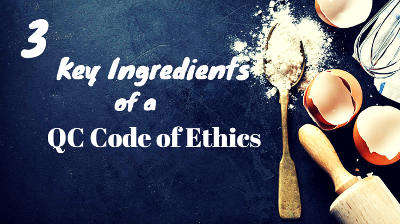 As a buyer of imported goods, have you considered the possibility of corruption making its way into your supply chain? Corruption can take many forms, but it’s often during product inspections where buyers show real concern.
As a buyer of imported goods, have you considered the possibility of corruption making its way into your supply chain? Corruption can take many forms, but it’s often during product inspections where buyers show real concern.
In an earlier article, I touched on how to prevent bribery during a QC audit. In this article, I’ll get into more detail with one particular tool for preventing bribery, a strong QC Code of Ethics.
Different Companies’ Code of Ethics Can Vary Considerably
All companies have some kind of ‘code’ that they follow. A large multinational company like Amazon or Walmart would likely have a longer, more detailed Code of Ethics, since their employees are from all parts of the world. On the other hand, a local family business with only 5-10 workers may not need an official document. The purpose of a Code of Ethics, though, is to detail the pragmatic necessities of running a company in a morally ambiguous world.
The reality is that ideas of right and wrong, professional and unprofessional, can vary drastically from person to person and from culture to culture. When you work with a foreign company, you cannot assume that everyone will be on level with you when it comes to best practices. A strong QC Code of Ethics can tell you how your QC company navigates moral and ethical decisions. You can trust the auditors won’t take a bribe just because “that is how they do things over there” and your supplier can also trust the auditors won’t ask for a bribe in exchange for lenient reporting.
What makes a strong Code of Ethics?
Take Google as an example. You can assume that their Code of Conduct is a detailed, solid document because – well, it’s GOOGLE’s! But the operations and challenges of a diversified giant like Google are different from those of a QC company. It makes sense that their Code of Ethics needs to reflect those needs. For a QC company’s Code of Ethics the most important features are accessibility, practicability and procedures.
Accessibility of the QC Code of Ethics
For the Code of Ethics to be of any real use, all involved parties must read the document. You, as the buyer, are well within your right to request that the supplier work with outside QC companies.  And if the factory wants your business, they don't have that much of a choice about cooperating with this request. This means that if the Code of Ethics is too difficult to read, most factories just won’t bother.
And if the factory wants your business, they don't have that much of a choice about cooperating with this request. This means that if the Code of Ethics is too difficult to read, most factories just won’t bother.
Right off the bat, a version of the document in the supplier’s local language must be made available. The more important point though, is that the document must be concise. There is a reason people joke that "I have read and agreed to the iTunes terms and conditions" is this generation's most common lie. People are more likely to read a Code of Ethics that is concise and to-the-point
If we revisit the example of Google, their Code of Conduct is thorough, candid and does a good job of avoiding complex legal jargon, but it is also very long. It might seem like a good idea for a QC company's Code of Ethics to be as comprehensive as Google’s, but in the long run, brevity is more important.
Practicability and Application
The second point that sets a QC company’s Code of Ethics apart is how concrete it is. Despite all the earlier talk of morality, a QC company’s Code of Ethics sometimes looks more like a list of procedures and less like a guide for traversing morally-tricky territory. This locks down a strong, simple stance on the complex issues surrounding bribery and corruption.
Unfortunately, corruption often has a lot more grey area than we would like. Nowadays, it is pretty well understood that auditors taking an envelope of money from a factory is not acceptable. This means the type of corruption that is harder to detect and police will be the one more likely to plague your supply chain. It’s this type of corruption that needs to be addressed explicitly in a QC company’s Code of Ethics. So QC companies need to be specific when addressing possible scenarios in which bribery could occur.
Procedures During Product Inspection
Having procedures in place to address certain situations is an important part of any effective QC Code of Ethics. In the QC industry, auditors often do a majority of their work independently. They travel to factories, often alone, and carry out an inspection, the results of which they report to the buyer. Occasionally, auditors will find themselves in positions where corruption may present itself. Without clearly defined procedures in place to handle these kinds of situations, a QC company may need to rely on the moral judgement of each auditor. That’s why it’s absolutely vital that a QC company have a detailed procedure for handling every conceivable instance where an auditor might be tempted to accept a bribe.
In InTouch’s Code of Ethics for example, we target actions that can affect the professionalism of our auditors. If an auditor is offered a bribe, for example, they are required to report it immediately to their Quality Manager. But the line between courtesy and corruption can often be blurred. Procedures need to be in place to take out the ‘guess work’. For example, auditors are prohibited from accepting even simple courtesies or gratuities, like gum or coffee, from people at a factory. They are also forbidden to engage in more culturally specific activities, such as karaoke or sight-seeing, with factory staff or management. These seemingly innocent gestures can often mark the beginning of a slippery slope. Our code lays out procedures to deal with these and other situations that are inherently more complicated – situations in which an auditor might be unsure how to handle themselves.
Conclusion
Integrity and corruption are difficult issues to tackle in any international business. Corruption in the quality control industry is no different. Different languages and cultures often create added opportunity for corruption and frustrating misunderstandings. A strong QC Code of Ethics helps to eliminate the grey areas of integrity and set clear guidelines for auditor conduct and procedures.
If y ou are a buyer of imported goods that relies on product inspections or factory audits from a third-party, have a look at your QC provider’s own Code of Ethics. Is it thorough and specific? Does the Code of Ethics have a version written in the local language? Does the Code of Ethics contain specific procedures for addressing all conceivable scenarios in which bribery or corruption could be an issue? If not, you should definitely be questioning your supplier about how they plan to mitigate corruption risk.
ou are a buyer of imported goods that relies on product inspections or factory audits from a third-party, have a look at your QC provider’s own Code of Ethics. Is it thorough and specific? Does the Code of Ethics have a version written in the local language? Does the Code of Ethics contain specific procedures for addressing all conceivable scenarios in which bribery or corruption could be an issue? If not, you should definitely be questioning your supplier about how they plan to mitigate corruption risk.
Don’t let corruption lead to inaccurate reporting of QC issues that could compromise your next order!






